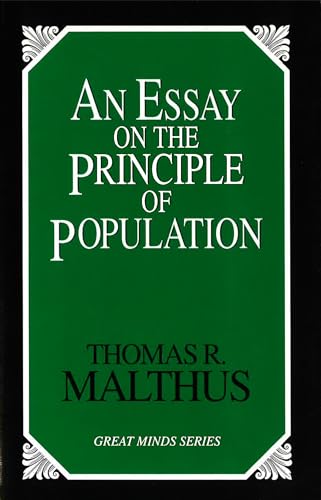
Inhaltsangabe
English economist and professor Thomas R. Malthus (1766-1834) caused great public controversy among the optimistic positivitists of his day when his Essay on the Principle of Population (1798) showed incontrovertibly that population, when unchecked, tends to increase faster than the availability of subsistence. Therefore preventive checks on population increase are necessary. Malthus, whose work influenced the research of Charles Darwin, admitted he was pessimistic about the future of humankind. He argued, through mathematical proofs and scientific documentation, that without population control the societal result is overcrowding, disease, war, poverty, and vice.
Die Inhaltsangabe kann sich auf eine andere Ausgabe dieses Titels beziehen.
Über die Autorin bzw. den Autor
THOMAS ROBERT MALTHUS was born in Rookery, Surrey, England, in February 1766. He attended Cambridge University, earning a master's degree in 1791. In 1805 he became a professor of history and political economy at the East India Company's college in Haileybury, Hertfordshire, a position he held for the rest of his life.
Malthus is most famous for his Essay on the Principle of Population Control (1798), which argues that increases in population will eventually overcome the world's ability to feed itself, resulting in widespread starvation. He based this conclusion on the belief that populations grow at a geometric rate, whereas the food supply increases at an arithmetic one.
A pessimist who viewed the notion of human perfectibility as foolishness, Malthus saw famine, disease, and war as necessary checks on population growth. Later he believed that "moral restraint"
(delayed marriage and sexual abstinence prior to it) could also help curb the problem.
Malthus's works on economics include An Inquiry into Nature and the Progress of Rent (1815) and Principles of Political Economy (1820). Many ideas contained in these works anticipate the thinking of economist John Maynard Keynes, who lived a century later. Malthus's pessimistic assessment of life as a "struggle for existence" also influenced Charles Darwin's evolutionary mechanism of natural selection, or "survival of the fittest."
Thomas Malthus died at Haileybury on December 23, 1834.
„Über diesen Titel“ kann sich auf eine andere Ausgabe dieses Titels beziehen.
Weitere beliebte Ausgaben desselben Titels
Suchergebnisse für An Essay on the Principle of Population (Great Minds)
An Essay on the Principle of Population
Anbieter: Better World Books, Mishawaka, IN, USA
Zustand: Good. Former library book; may include library markings. Used book that is in clean, average condition without any missing pages. Artikel-Nr. 11918897-6
Essay on the Principle of Population
Anbieter: ThriftBooks-Atlanta, AUSTELL, GA, USA
Paperback. Zustand: Very Good. No Jacket. May have limited writing in cover pages. Pages are unmarked. ~ ThriftBooks: Read More, Spend Less. Artikel-Nr. G1573922552I4N00
An Essay on the Principle of Population (Great Minds Series)
Anbieter: Bookplate, Chestertown, MD, USA
Soft cover. Zustand: As New. Reprint. Clean, unmarked, as new copy. BP/Econ. Artikel-Nr. ABE-1656626889548
An Essay on the Principle of Population. [Great Minds Series]
Anbieter: G. & J. CHESTERS, TAMWORTH, Vereinigtes Königreich
Soft cover. Zustand: As New. pp.ix, 396 pages, an As New paperback [1573922552]. Artikel-Nr. 62613
Gebraucht kaufen
Anzahl: 1 verfügbar

